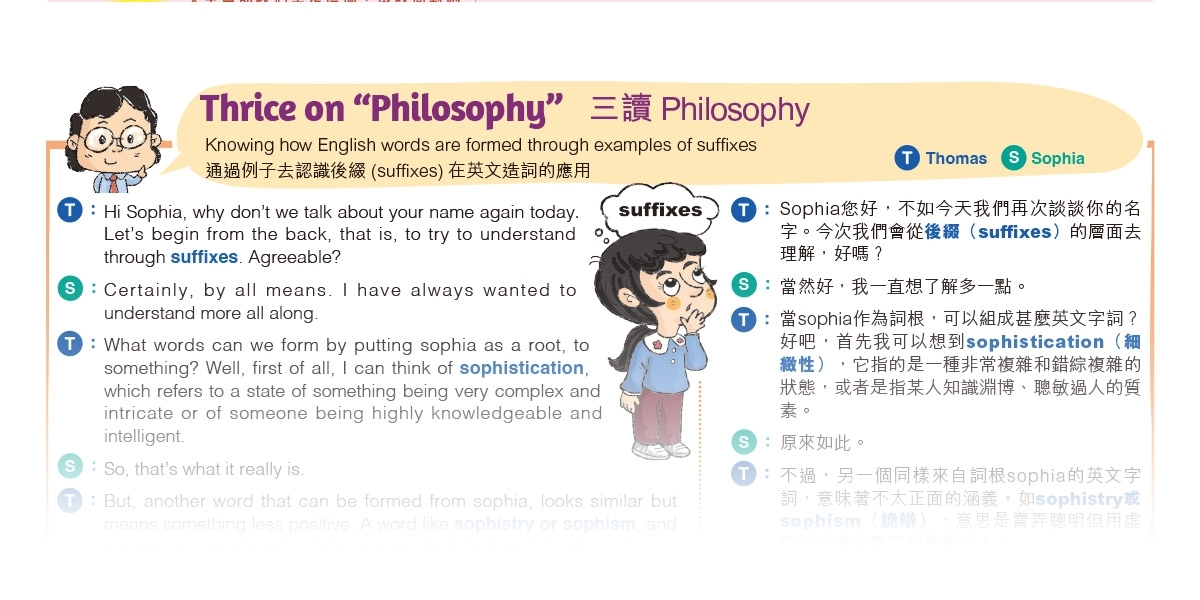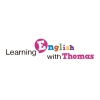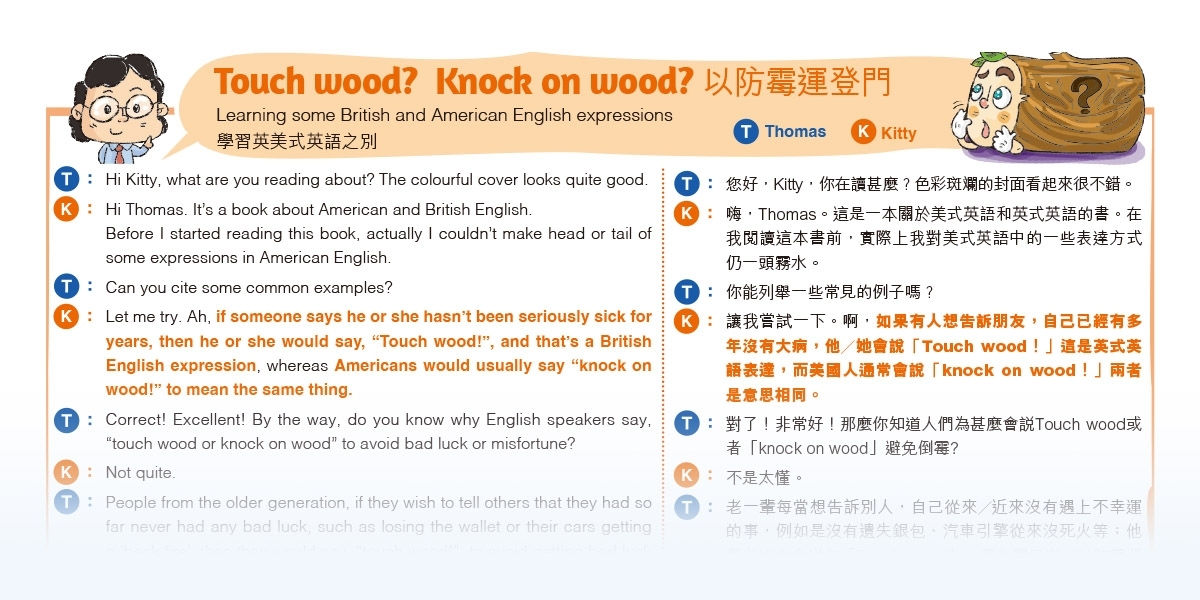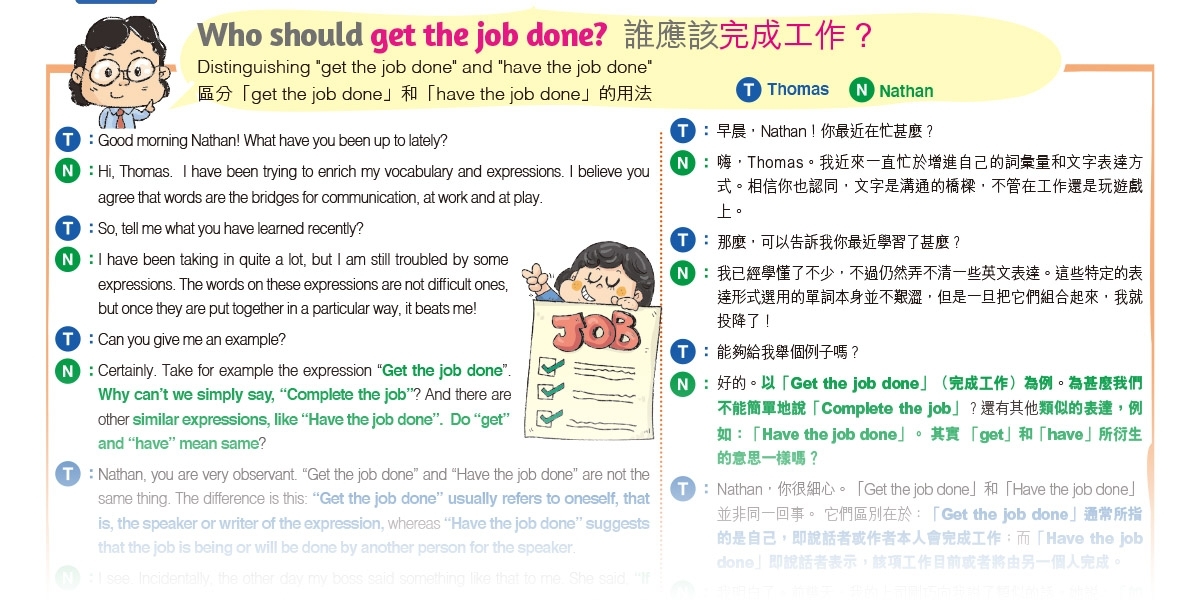昔日文章


Learning English with Thomas
2023.04.16
Thriceon“Philosophy”
三讀Philosophy
Knowing how English words are formed through examples of suffixes
通過例子去認識後綴 (suffixes) 在英文造詞的應用
T: Thomas, S: Sophia
T: Hi Sophia, why don’t we talk about your name again today. Let’s begin from the back, that is, to try to understand through suffixes. Agreeable?
S: Certainly, by all means. I have always wanted to understand more all along.
T: What words can we form by putting sophia as a root, to something? Well, first of all, I can think of sophistication, which refers to a state of something being very complex and intricate or of someone being highly knowledgeable and intelligent.
S: So, that’s what it really is.
T: But, another word that can be formed from sophia, looks similar but means something less positive. A word like sophistry or sophism, and it means to use clever but false arguments to fool and cheat people.
S: Oh, I don’t like the way they treated people.
T: Of course not. They are derived from the root sophia plus suffixes like−istry and−ists and−istication, and so on.S: Thanks Thomas Sir. You have taught me a lot. Can I buy you coffee?
T: Oh, that’s very gracious of you. I’d rather have tea, can I?
T: Sophia您好,不如今天我們再次談談你的名字。今次我們會從後綴(suffixes)的層面去理解,好嗎?
S: 當然好,我一直想了解多一點。
T: 當sophia作為詞根,可以組成甚麼英文字詞? 好吧,首先我可以想到sophistication(細緻性),它指的是一種非常複雜和錯綜複雜的狀態,或者是指某人知識淵博、聰敏過人的質素。
S: 原來如此。
T: 不過,另一個同樣來自詞根sophia的英文字詞,意味著不太正面的涵義。如sophistry或 sophism(詭辯),意思是賣弄聰明但用虛假的論據來愚弄和欺騙他人。
S: 噢,我不喜歡他們這樣待人。
T: 當然不能那樣。這些字詞組成都是從詞根 sophia加上不同的後綴而來,如-istry和-ists 和-istication等等。
S: 謝謝Thomas老師。你教懂了我很多。我可以請你喝咖啡嗎?
T: 噢,你太客氣了。我寧願喝茶,可以嗎?


中學專題
2023.03.24
元朗天主教中學
飛盤運動 培養公平競技精神
(本報專題)一項沒有裁判,融合了美式足球、曲棍球、足球、籃球等得分的團隊運動「終極飛盤」( Ultimate Frisbee),是元朗天主教中學過去10年來發展的運動之一,歷年培訓了逾70名學生參與,當中更有學生成為香港隊,現仍也在該校擔任飛盤教練,薪火相傳,向學生傳承公平競賽與團結的飛盤精神。
元朗天主教中學飛盤校隊於2013年成立,當年成為全港首支華人學界飛盤校隊。現時飛盤校隊共有19名隊員,教練及助教也由舊生擔任,黃見儀校長指出,由舊生兼港隊運動員向學生教授飛盤技巧,成為學生模範,「舊生與學生同行, 這份陪伴也能加強學生對學校的歸屬感。」
沒有裁判 彰顯體育精神
飛盤爭奪賽(Ultimate Frisbee)又名為「終極飛盤」,兩隊對賽時設進攻及防守,隊員透過跑動和傳接飛盤把飛盤傳送至得分區(End zone)才能取得分數。
進攻的一方手持飛盤時,運動員的重心腳不能移動,持飛盤時間也不可超過10秒, 否則犯規便要攻守交換;至於防守的一方, 防守期間不能觸碰對手攔截飛盤,要阻止對手傳盤,可以趁著對手傳出飛盤在空中飛翔時在空中截盤或拍落飛盤,或是對手進攻時漏接、飛盤落在地上、傳盤出界、出界接盤等攻守互換。
何家健老師於1 0年前把飛盤運動引入,他表示,飛盤比賽不設裁判,靠著雙方自律地持守公平進行競技,從中培養學生合作精神及良好的體育精神與態度,「不論是對方或自己犯規,也需要兩隊自行討論裁決,當自己犯錯,便要主動承認錯失,從錯誤中作出改善,學生從中學習溝通,避免再犯。」
何Sir帶領飛盤校隊已10年,見證著學生從飛盤運動中成長。現時飛盤校隊教練、香港飛盤代表隊成員陳樂瑤是該校舊生,亦是首屆參與飛盤校隊的一員,她表示,本身喜歡打排球,後來見到同學玩飛盤的技巧感到很有趣,於是在中四下學期開始參加。她對於這項運動愈來愈投入,中六畢業後更獲選為香港飛盤隊成員一直至今,現在也投身與運動相關的行業,同時在不同的學校擔任飛盤教練以作推廣。
飛盤運動鼓勵學習
疫情前,該校的飛盤比賽成績不俗,於2019學年在第一屆全港中學飛盤聯賽第一站(高級組)奪得碟賽冠軍;飛盤校隊也曾到天主教的小學進行飛盤活動推廣,何Sir 表示,從中提升學生的溝通能力和自我價值,並提升學校形象。
飛盤運動在一般華語學校並不普及,參加者多來自國際學校,黃見儀校長觀察到,引入西方運動同時訓練學生的英文會話自信心,她說:「學生在賽場上面對大部分也是以英語為母語的運動員,無形推動學生主動說英文的能力。」
本年一月底舉行的全港學界飛盤比賽2023(冬季賽),正好讓隊伍展現團結與自信。教練陳樂瑤形容,該校首場對壘的隊伍,正是學界實力最強的一所國際學校,原以為會大比數落後,結果即使最終落敗,也只是相差一分,該校在整個賽事獲得第五名,她表示,對團隊而言別有意義。
運動促進友誼
中三學生趙博誠於比賽期間,曾與對手爭持是否成功得分時情緒顯得波動,幸得隊員一直大聲提點他冷靜行事,最終也能完滿解決,「飛盤比賽不設裁判的規則,讓我更明白誠信與公平的重要。」
「PP,Mission!PP,Mission!PP, Mission!」隊伍圍圈手持飛盤,在隊長帶領下一連三聲喊叫口號,兩個「P」分別是指Perfect(完美)及Professional(專業), 鼓勵隊員在賽事中持守的使命。飛盤隊隊長、中五級學生劉昊霖由中一開始參與飛盤隊, 當見到隊員成功防守, 他便會高呼「Nice D(defence)」;即使失去進攻權, 也會即時鼓勵隊友「good try」。他認為從失誤中學習也是爭勝的先決條件,「只要謹記錯失避免再犯,相信下次可以做得更好。」
賽後兩隊會圍成一個圈進行Spirit Circle 環節,兩隊成員梅花間竹的排列圍成圓圈, 先由隊長代表校方表達意見,隨後各人互相交流,劉昊霖說:「當中分享對賽事的感受,值得欣賞、學習與改進的地方。」交流過程中結織新朋友,促進社交能力。
訪問當天,學校課後正是聯課活動日, 在多項活動中設有飛盤訓練,兩名舊生兼助教陳家熙和葉耀宗早在學生下課前已回校準備,他們表示喜歡與學生成為同行者,每次訓練時一起切磋飛盤技術,葉耀宗表示,藉著飛盤提升自己的表達技巧,「讓同學易於明白飛盤運動並不困難,從中吸引更多同學參與。」
中二學生丘春天本學年加入飛盤隊,他說隊伍的團結與互助,令他愈來愈投入校園生活,他最初以為高中學生對低年級學生很冷漠,「但是在飛盤隊感到有如家人,隊友樂意幫助我提升飛盤技巧,耐心及有耐性向我教授姿勢與傳接飛盤的技巧。」
黃見儀校長看到飛盤運動要求的公平與公正,彰顯天主教教育核心價值講求的「真理」,展現校訓「地鹽世光」,「相信所有學生也有才能,飛盤也是其中方式,讓學生盡展所長,展現活力的人生的積極態度。」(高)


Learning English with Thomas
2023.02.19
Touch wood? Knock on wood?
以防霉運登門
Learning some British and American English expressions
學習英美式英語之別
T: Thomas J: Kitty
T : Hi Kitty, what are you reading about? The colourful cover looks quite good.
K : Hi Thomas. It’s a book about American and British English.
Before I started reading this book, actually I couldn’t make head or tail of some expressions in American English.
T : Can you cite some common examples?
K : Let me try. Ah, if someone says he or she hasn’t been seriously sick for years, then he or she would say, “Touch wood!”, and that’s a British English expression, whereas Americans would usually say “knock on wood!” to mean the same thing.
T : Correct! Excellent! By the way, do you know why English speakers say, “touch wood or knock on wood” to avoid bad luck or misfortune?
K : Not quite.
T : People from the older generation, if they wish to tell others that they had so far never had any bad luck, such as losing the wallet or their cars getting a ‘back fire’, then they would say, “touch wood!”, to avoid getting bad luck that may be just around the corner waiting for them.
K : I see.
T : As a matter of fact, there is also a similar usage in Chinese, namely, “toi-lai”, meaning literally. “relying under the protection of external force”.
K : That’s very interesting. (Thomas nodding smilingly)
T : 您好,Kitty,你在讀甚麼?色彩斑斕的封面看起來很不錯。
K : 嗨,Thomas。這是一本關於美式英語和英式英語的書。在我閱讀這本書前,實際上我對美式英語中的一些表達方式仍一頭霧水。
T : 你能列舉一些常見的例子嗎?
K : 讓我嘗試一下。啊,如果有人想告訴朋友,自己已經有多年沒有大病,他╱ 她會說「Touch wood!」這是英式英語表達,而美國人通常會說「knock on wood!」兩者是意思相同。
T : 對了!非常好!那麼你知道人們為甚麼會說Touch wood或者「knock on wood」避免倒霉?
K : 不是太懂。
T : 老一輩每當想告訴別人,自己從來╱近來沒有遇上不幸運的事,例如是沒有遺失銀包、汽車引擎從來沒死火等;他們之後也會說句「Touch wood」,避免開口中,以防霉運登門。
K : 原來如此。
T : 其實,中文也有類似用法, 例如「托賴」,意思是指有賴於外力保護。
K : 這很有趣。(Thomas 微笑點頭)


Learning English with Thomas
2023.01.06
Who should get the job done? 誰應該完成工作?
Distinguishing "get the job done" and "have the job done" 區分「get the job done」和「have the job done」的用法
T : Thomas, N : Nathan
T: Good morning Nathan! What have you been up to lately?
N: Hi, Thomas. I have been trying to enrich my vocabulary and expressions. I believe you agree that words are the bridges for communication, at work and at play.
T: So, tell me what you have learned recently?
N: I have been taking in quite a lot, but I am still troubled by some expressions. The words on these expressions are not difficult ones, but once they are put together in a particular way, it beats me!
T: Can you give me an example?
N: Certainly. Take for example the expression “Get the job done”. Why can’t we simply say, “Complete the job”? And there are other similar expressions, like “Have the job done”. Do “get” and “have” mean same?
T: Nathan, you are very observant. “Get the job done” and “Have the job done” are not the same thing. The difference is this: “Get the job done” usually refers to oneself, that is, the speaker or writer of the expression, whereas “Have the job done” suggests that the job is being or will be done by another person for the speaker.
N: I see. Incidentally, the other day my boss said something like that to me. She said, “If you’re too busy to get the documents copied right away, have it done by Sandy.”
T: You’ve got it all, Nathan! Great!
T: 早晨,Nathan!你最近在忙甚麼?
N: 嗨,Thomas。我近來一直忙於增進自己的詞彙量和文字表達方式。相信你也認同,文字是溝通的橋樑,不管在工作還是玩遊戲上。
T: 那麼,可以告訴我你最近學習了甚麼?
N: 我已經學懂了不少,不過仍然弄不清一些英文表達。這些特定的表達形式選用的單詞本身並不艱澀,但是一旦把它們組合起來,我就投降了!
能夠給我舉個例子嗎?
好的。以「Get the job done」(完成工作)為例。為甚麼我們不能簡單地說「Complete the job」?還有其他類似的表達,例如:「Have the job done」。 其實 「get」和「have」所衍生的意思一樣嗎?
T: Nathan,你很細心。「Get the job done」和「Have the job done」並非同一回事。 它們區別在於:「Get the job done」通常所指的是自己,即說話者或作者本人會完成工作;而「Have the job done」即說話者表示,該項工作目前或者將由另一個人完成。
N: 我明白了。前幾天,我的上司剛巧向我說了類似的話。她說:「如果你忙得不能立即複印這份文件,那麼找Sandy代勞。」
T: Nathan你真的學懂了!非常好!


